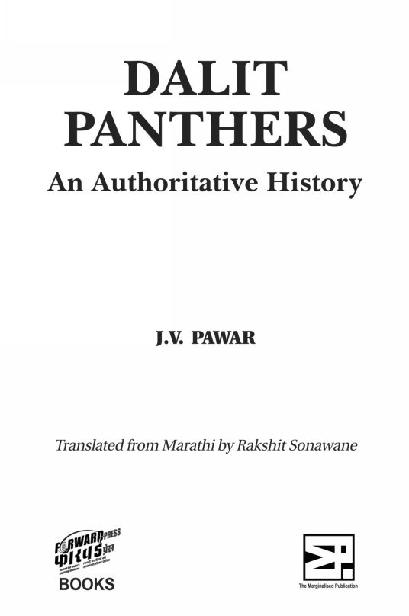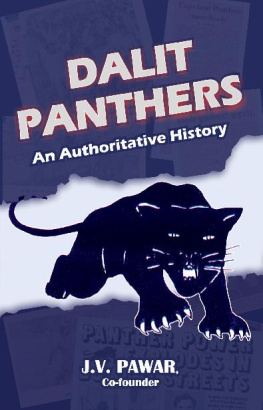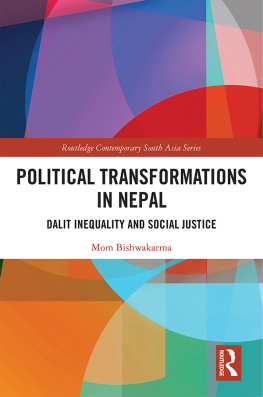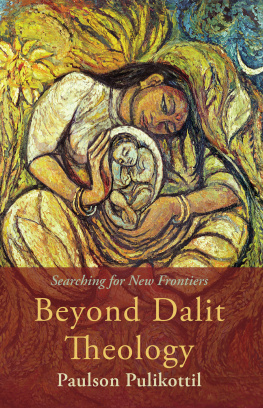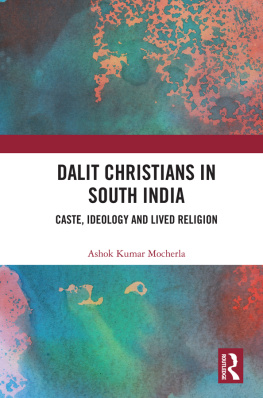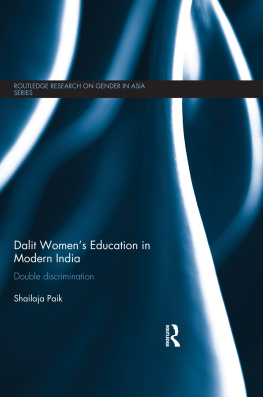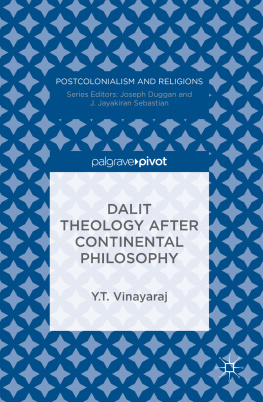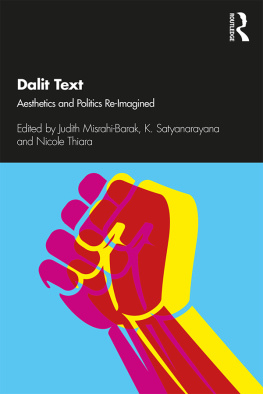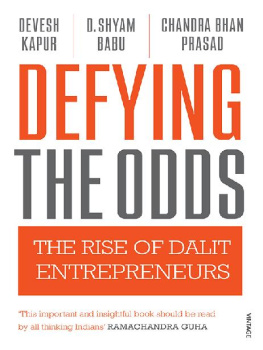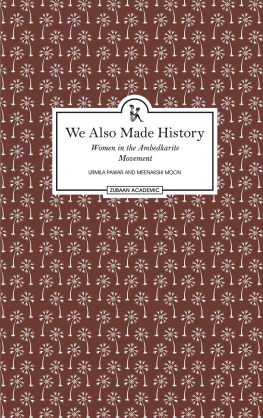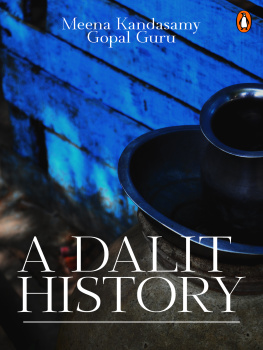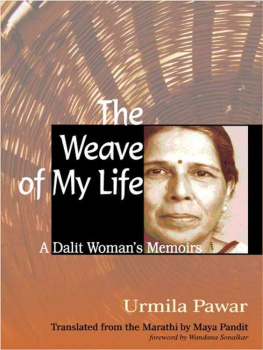Dedicated to
Bhagwat Jadhav
who became the first martyr of the Dalit
Panther movement on 10 January 1974
Ramesh Deorukhkar
who was killed in police firing in the Worli riots
in January 1974
Vasant Dhamankar
who died on 28 October 1974 in Nagpur,
after the first Dalit Panthers convention
ISBN: 978-93-87441-04-0 (Paperback)
978-93-87441-05-7 (Hardback)
First Edition: 2017
Publisher: Forward Press Books,
803 Deepali, 92 Nehru Place,
New Delhi - 110019
Email: info@forwardmagazine.in
Phone: +91-7827427377, 9968527911
Jaimala Pawar
Cover & Layout design: Rajan Kumar
DALIT PANTHERS: An Authoritative History (History of a Social Movement)
By J.V. Pawar
Contents
Preface
The golden period of the Ambedkarite movement after the demise of Dr Babasaheb Ambedkar belonged to the Dalit Panther. The militant organization was formed on 29 May 1972. Five years later, it was disbanded through a declaration at a press conference held in Mumbai on 7 March 1977. An ideological schism among its leaders prompted Namdeo Dhasal to sack Raja Dhale and me by announcing it in the newspapers published from Mumbai on 30 September 1974. It culminated in Dhasal being sacked at the first convention of the organization held in Nagpur on 23 and 24 October 1974. In June 1975, then Prime Minister Indira Gandhi declared Emergency in India, imposing restrictions on newspapers and organizations. Hence, the period from May 1972 to June 1975 was the most crucial in the activities of the Dalit Panther movement.
During this period, the Dalit Panther movement caused a storm, shattering contemporary sociopolitical ethos and recharging Ambedkars followers to combat rising injustice and atrocities. It transformed youths, who took to the streets as committed foot soldiers of the movement, took on the system and provided relief to the victims. During its short life, the organization shook up the government from its slumber and forced it to take note of the plight of the oppressed people. The struggle of the Dalit Panther movement was not just for the economic upliftment of the Dalits but also for the implementation of their Constitutional rights and the establishment of liberty, equality and fraternity.
The Dalit Panther was at its prime until 4 January 1974. On 5 January 1974, a masterminded riot engulfed the entire Mumbai metropolis, especially Worli and Naigaon, and claimed the lives of Dalit Panthers Bhagwat Jadhav and Ramesh Deorukhkar. The riot devastated the lives of numerous youngsters, who lost their jobs and had to languish in prisons. Their sacrifices, however, rejuvenated the Ambedkarite movement, in sharp contrast to those who had mortgaged it at the feet of the rich and the powerful in return for crumbs of power and wealth. During its short life, the Dalit Panther made a lasting impact on Indian society and politics. The impact of the movement has been so historic that after four members of a Dalit family (including a woman and her teenage daughter) were brutally killed in Khairlanji village in Bhandara district of Maharashtra in 2006, there were spontaneous demands for a militant organization like the Dalit Panther to take on the perpetrators of caste atrocities.
A lot has been written on the movement, including research papers and anthologies, based on information gathered from newspapers and conversations with the people who were in the movement. The movement has been analyzed and interpreted by many to suit their convenience or ideological stance, often veering off on the verge of distorting history. For the sake of easy publicity and the consequent gains, many people masqueraded as experts on the movement, including some claiming to have fathered it. I have been a witness of this period from day one. I have actively participated in the movement, not just as a spectator or a writer, but also as one of the people who initiated it. Hence, while assigning the paternity of the Dalit Panther organization to Namdeo Dhasal and myself, I consider the nurturing of the movement by Raja Dhale as important.
I feel that only three persons can write the history of the Dalit Panther movement: Raja Dhale, Namdeo Dhasal and J.V. Pawar (myself). I was the organizer and later, the general secretary of the organization and therefore I am in possession of all the relevant correspondence and documentation. During those days, there were no photocopying machines and I had to use carbon paper to make copies of letters or statements, all of which I have preserved. What this means is that my writing is authentic and supported by documents. Besides, the Government of Maharashtra gave me access to its archives, including documents from the police and intelligence departments, which further enriched me.
I have written a series in Marathi on The Ambedkarite movement after Dr B.R. Ambedkar and this book is the fourth in the series. The era of the Dalit Panther was the glowing period about which many people, including Raja Dhale, Namdeo Dhasal and other intellectuals have already written.
During the days of the Dalit Panther, Marathi newspaper Nava Kaal , founded by its editor Neelubhau Khadilkar, had opened its door for us, as if it were our mouthpiece. There were several other newspapers like Nav Shakti , Maratha , Maharashtra Times , Loksatta and Sakaal , which helped the movement by publicizing its activities. I am indebted to all of them.
Since Babasaheb Ambedkars Mahaparinirvan on 6 December 1956, the Ambedkarite movement has tasted both victory and defeat. The victory has been that the movement has, through the years, attained social, educational and cultural maturity. In the literature and the arts, the movement reached the pinnacle at various moments especially Ambedkarite literature, which has now gained respect and acceptance as the only literature that matters, because it is based on realism. So much so that what was so far called Dalit Literature is now referred to as Ambedkarite literature. The conditions in society today are vastly different from those prevailing in the pre-Ambedkar era and the transformation can be attributed to Ambedkars call to educate, organize and agitate.
I am not an activist or a writer from Ambedkars time. During Ambedkars time, many people contributed to the journals he edited Mook Nayak and Prabuddha Bharat . But they were simply chroniclers of that age. However, C.B. Khairmodes documentation remains quite invaluable. I did not want to merely document the post-Ambedkarite movement but also analyze it. I was involved in the movement myself. I wasnt merely an observer sitting on the sidelines. I can, therefore, stake my claim to analyze the history of the movement. Apart from being at the forefront of the movement since 1972, I led the student wing of Dadasaheb Gaikwads popular land agitation in 1964.
In 1972, with my poet-friend Namdeo Dhasal, I co-founded the Dalit Panther. Although it was a short-lived movement, just like the Black Panther in the United States, among all the post-Ambedkarite movements, the Dalit Panther enjoys the greatest admiration.
It was the period of struggle and hardships that earned Dalit Panthers their credibility and reputation in society. What Babasaheb Ambedkar had envisaged for the Republican Party of India (RPI) had failed to materialize. The post-Ambedkarite movement had begun to decline in the 1960s due to the ulterior motives of the Republican Party leaders and today the party has become an object of ridicule. Instead of concentrating on RPIs growth, its leaders helped strengthen the Congress party. The Congress party thus became more arrogant and exploitative. In the rural areas, it was Dalit Panthers who tried to stem the atrocities that were being inflicted on the Dalits. There was a growing consciousness among the Dalit masses that there was a group and an organization to protect them. Even today, when Dalits in villages face atrocities, people yearn for the resurgence of a movement like the Dalit Panther.
